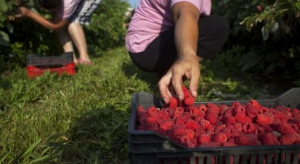In 2014 when storms and rain crashed into this fertile Macva area, 11 hectares of land on the Petrovic farm was flooded, most of the raspberry canes, carefully nurtured and cultivated by Petrovic family, were completely destroyed and the remaining canes started drying after the floods. Jovan gave up of any hope of profit from raspberry sales in the current or the next year.
He filed an application for support from the „EU assistance to flood affected areas in Serbia“ and in autumn 2014, FAO delivered to the family 1,800 high-quality, certified raspberry canes of the Tulameen variety, which yields very large and sweet raspberries produced mostly for the fresh market.

The four-member family Petrovic from Prnjavor near the town of Sabac, has been growing raspberies for years, agriculture being the only source of income for the family. Jovan, his wife Gordana and two sons Milan and Ivan, college students, cultivate maize, soybean, wheat and clover on 3,3 hectares of their own, and 10 hectares of leased land. They also raise cattle and pigs, and have about 50 acres of raspberries which have become very important source of income for the family in the last couple of years.
In 2014 when storms and rain crashed into this fertile Macva area, 11 hectares of land on the Petrovic farm was flooded, most of the raspberry canes, carefully nurtured and cultivated by Petrovic family, were completely destroyed and the remaining canes started drying after the floods. Jovan gave up of any hope of profit from raspberry sales in the current or the next year.
He filed an application for support from the „EU assistance to flood affected areas in Serbia“ and in autumn 2014, FAO delivered to the family 1,800 high-quality, certified raspberry canes of the Tulameen variety, which yields very large and sweet raspberries produced mostly for the fresh market.
By the end of July, the Petrovic family finished the first harvest of raspberries from the donation. The canes yielded six tonnes of raspberries grown on 50 acres, all sold to local cold storage. Jovan Petrovic says he is very satisfied with the quality and yield.
„The quality of raspberry canes we received as a donation was really good, and so is the yield we have. Since this is the first season of harvest of these raspberries, I expect even better yield and results in the next seasons. I thank with all my heart all who helped us to restore a part of our production after the floods – we are practically living from it. I believe that the EU donation meant a lot to all farmers in this area, no matter what kind of support and assistance package they received“.
In December 2014, fruit producers from Sabac municipality received 457.200 raspberry canes, of Tulameen, Meeker and Polka varieties. Iimported from England, the canes are certified and of exceptional quality. The Petrovics are just one of 254 farming families in the municipality who received raspberry cane assistance packages , donated by the EU and sourced and delivered by FAO.
During autumn and winter 2014 and 2015, fruit saplings and canes went to 2,002 farms in 30 Serbian municipalities. A total of 2,219,100 plum, cherry, sour cherry, raspberry and blackberry saplings and canes were planted in selected farmers’ orchards throughout Serbia, for a total value of Euro 1,259,610.Farms in the flooded areas also received spring and autumn crop seeds, fertilizer, animal feed, greenhouses, agricultural equipment, cattle and beehives. To date, assistance has reached a total of 29,448 farming families.
European Union assistance to flood relief in Serbia program, worth 92 million euros, is funded by the European Union under the pre-accession funds IPA 2012 and IPA 2014. The funds will be used for construction of new houses, rehabilitation of public buildings and infrastructure, private houses and roads and recovery of economy and agriculture in municipalities most affected with floods. All activities in the field are implemented by the United Nations Office for Project Services (UNOPS), Food and Agriculture Organization of the United Nations (FAO), organisations HELP and ABS and Danish Refugee Council (DRC), Austrian Development Agency (ADA) and World Bank – in coordination with Government of Serbia Public Investment Management Office.
The information and views set out in this document are those of the FAO and do not necessarily reflect the official opinion of the European Union.
Original Story was obtained from Food and Agriculture Organization of the United Nations website
Photo credit: FAO

